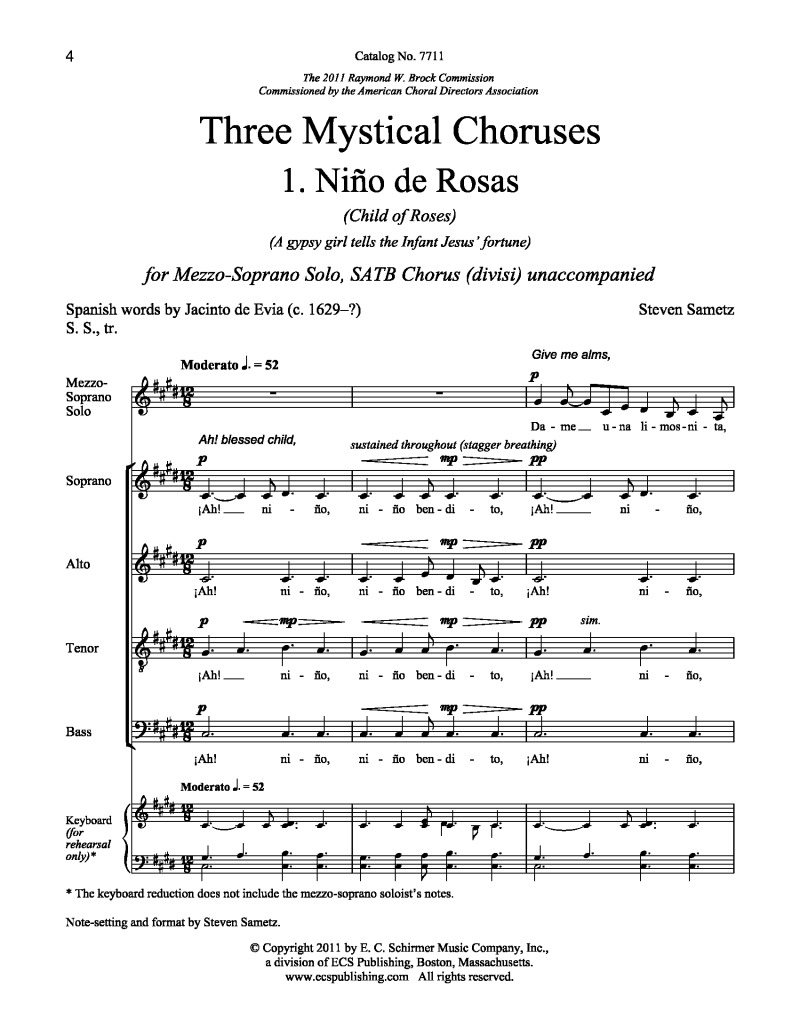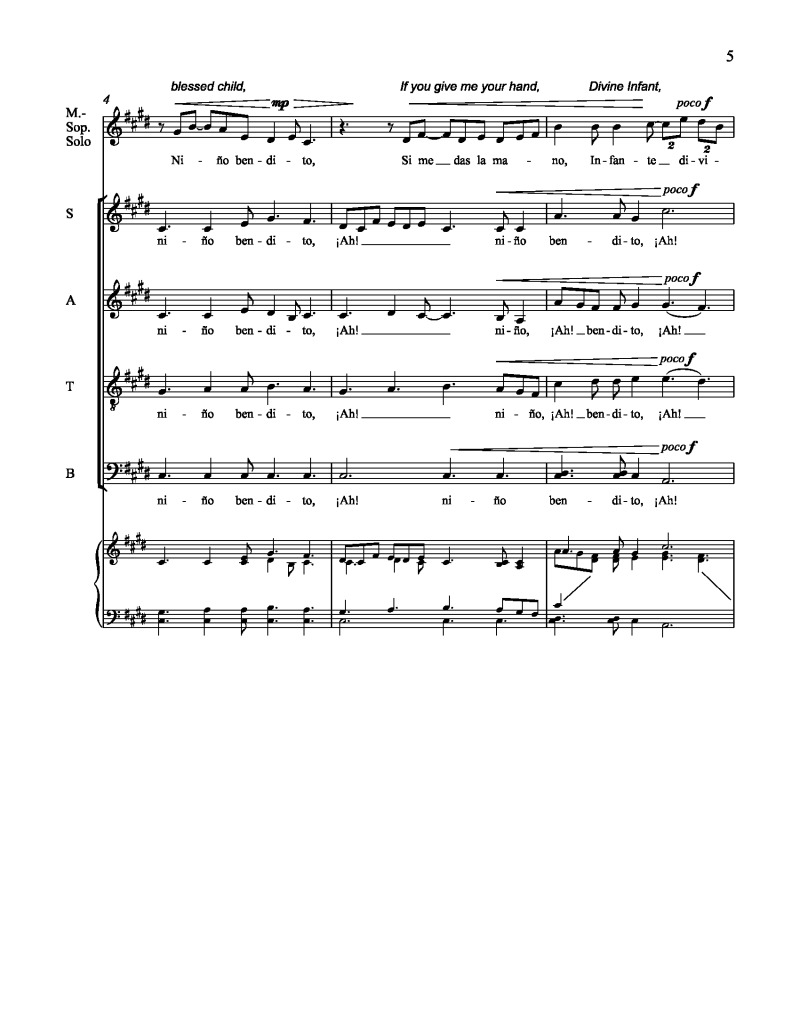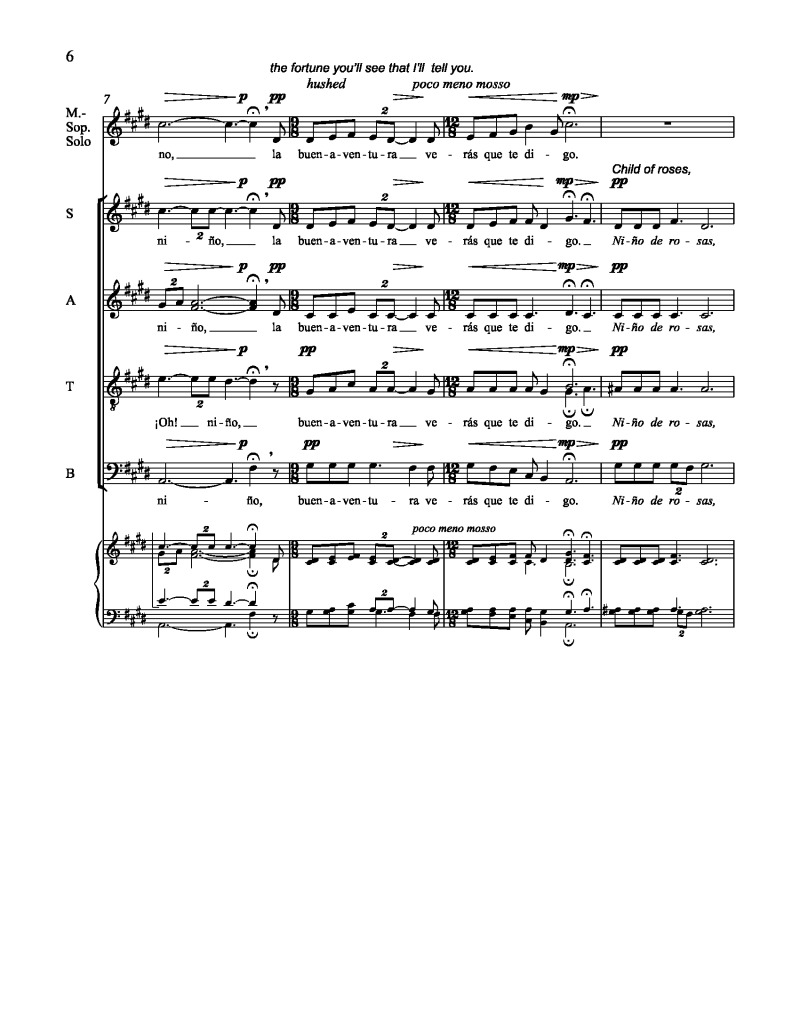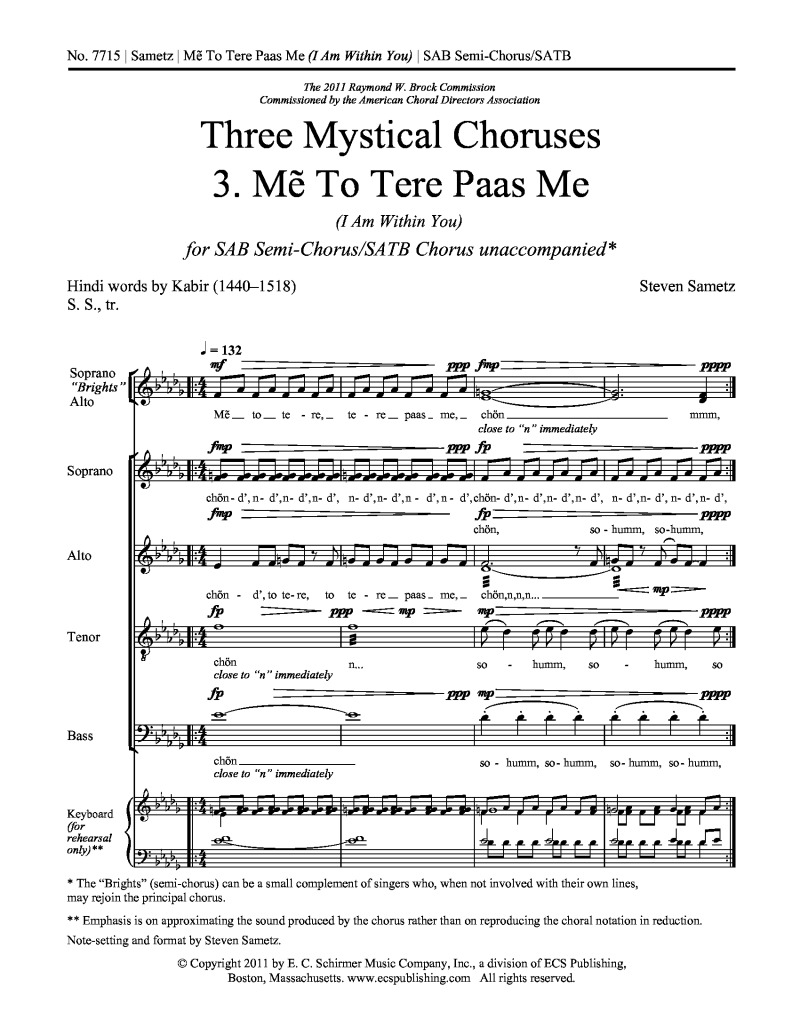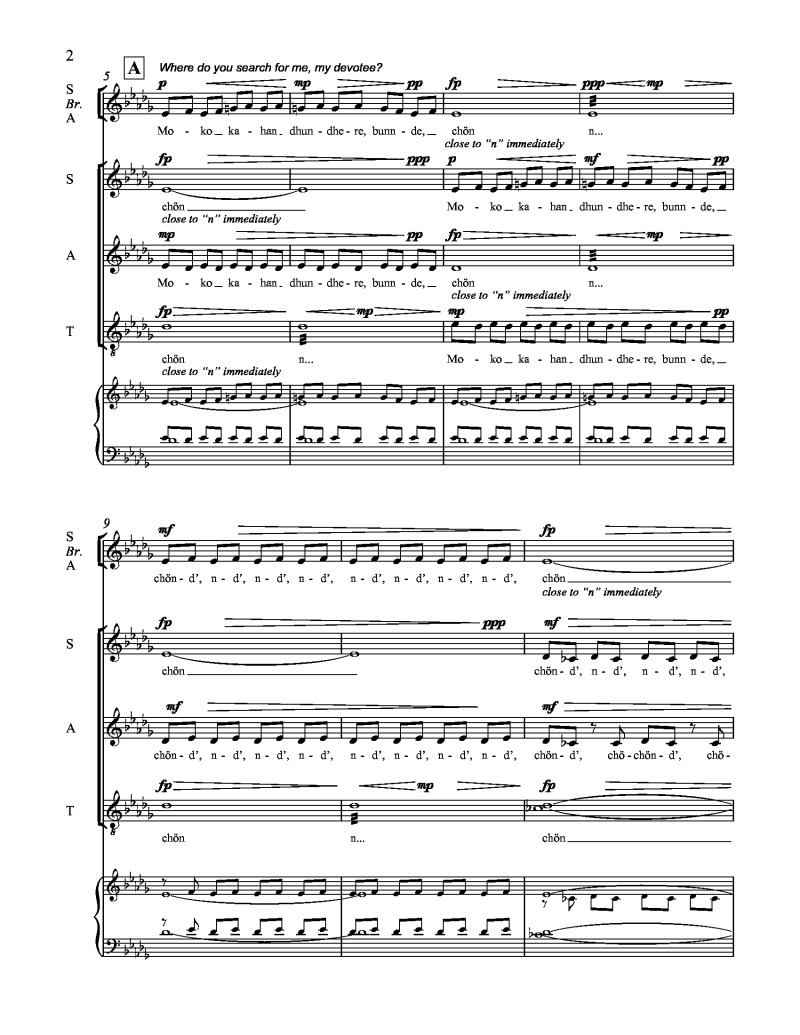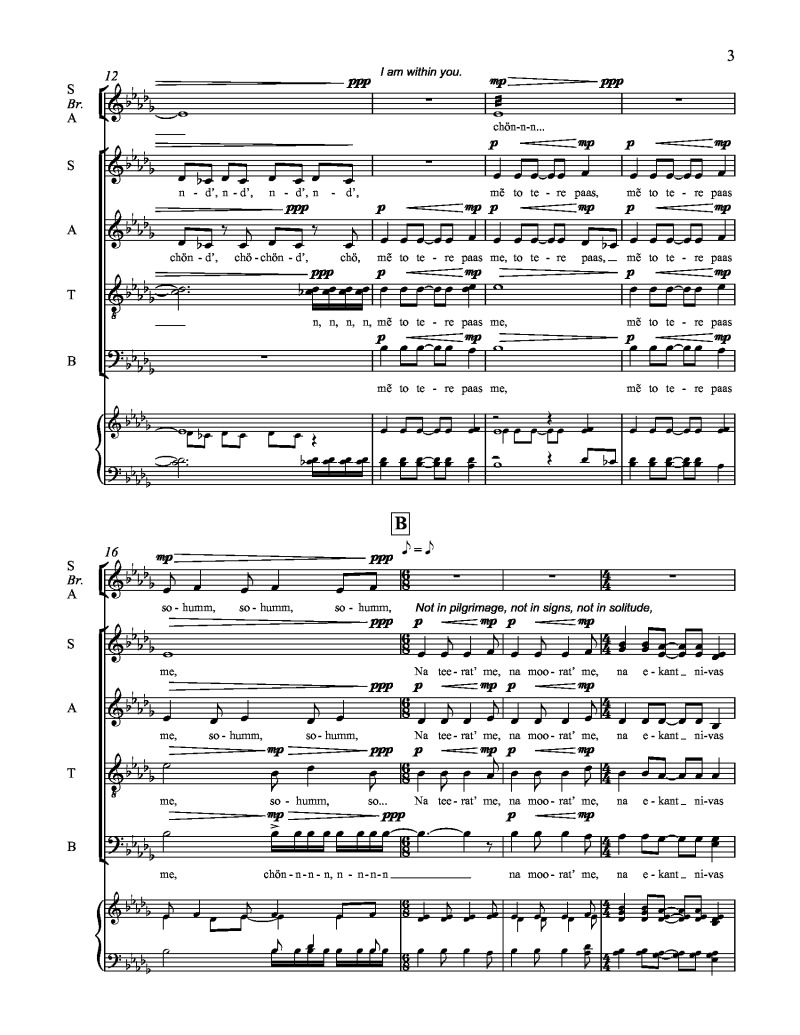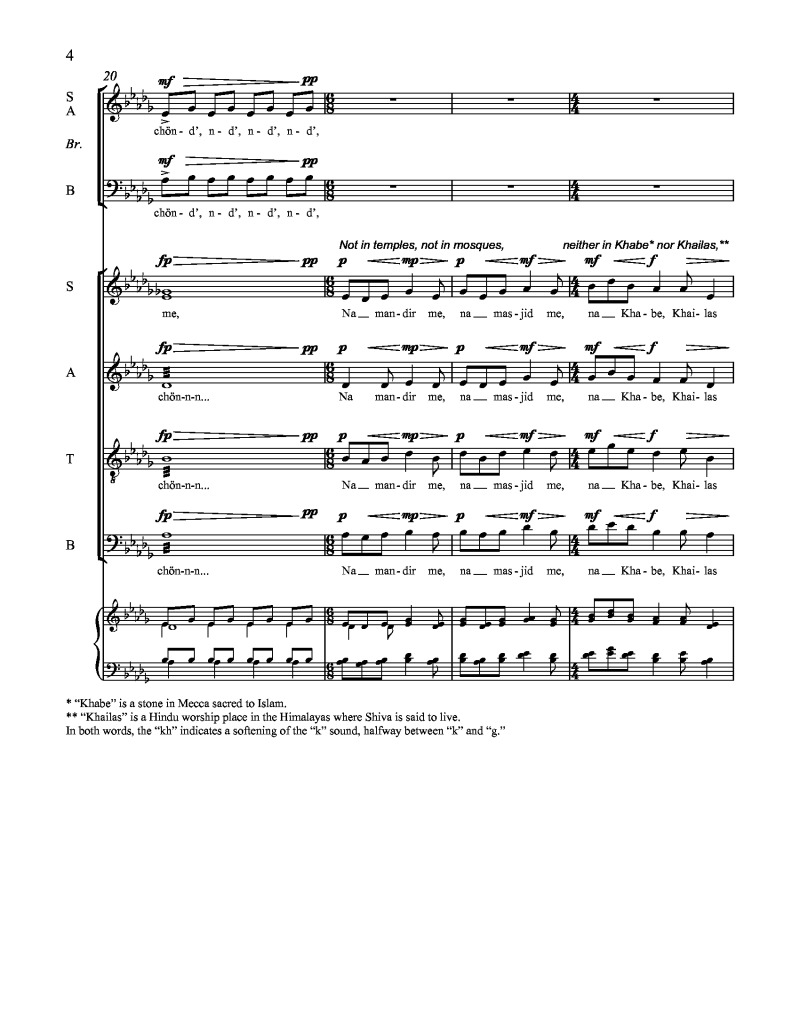-
Scoring
-
1. Niño de rosas (Child of Roses)
SATB, mezzo-soprano soloist2. Én kelohenu (There is none like our God)
Three versions:
a) SATB and SATB semi-chorus
b) SSAA and SSAA semi-chorus
c) TTBB and TTBB semi-chorus3. Mein to tere paas me (I Am Within You)
SATB and SAB semi-chorus -
Details
-
17:002011
Chanticleer at the American Choral Directors Association convention, 2011
Symphony Hall, ChicagoAmerican Choral Directors Association - Raymond W. Brock commission, 2011
No. 1 ECS#7711, Mezzo-Sop solo & SATB divisi
No. 2a ECS #7712, SATB and SATB semi-chorus
–No. 2b ECS #7713, SSAA and SSAA semi-chorus
–No. 2c ECS #7714, TTBB and TTBB semi-chorus
No. 3 ECS #7715, SATB and SAB semi-chorus -
Program Notes
-
Three Mystical Choruses takes us on a spiritual journey, from individual transformation (Niño de Rosas), through congregational prayer (En Kelohenu – There is None Like Our God) to an examination of the Divine itself (Me to tere paas me – I Am Within You). Drawing from Christian, Jewish, and Hindu-Islamic-Sikh traditions, Three Mystical Choruses points us towards that commonality in all religions, whether it be called “Unio Mystica,” “Ein Sof” or “Tat Avam Asi,” where a sacredness arises that is beyond words but which is – mystically and wondrously! – frequently accessed in the act and art of choral singing.
Each of the Three Mystical Choruses finds a synthesis of seeming dualities. In the opening lullaby, Niño de Rosas, the gypsy girl is so taken into the world of the infant Christ that, as she tells his fortune, it is she who finds her spiritual saviour. En Kelohenu, a Hebrew congregational prayer, pays tribute to one of the great choral touchstones of our time, the Ave Maria of Franz Biebl, and in so doing raises important questions of reconciliation and forgiveness as a possible key to communal spiritual harmony. The final chorus, Me to tere paas me, sets a poem of the Indian poet Kabir, in which Kabir points out that spirituality is not “otherness,” but a part of ourselves.
The compositional discourse of Me to tere paas me begins with the sound of a domestic loom (Kabir was a weaver by trade) and uses Indian raga-like motives, highly coloristic timbral effects in the style of electronic digital delay, and aleatoric writing. Although each of the Three Mystical Choruses may be performed independently, it is as a set that they lead to Kabir’s summation: that no one religion may lay claim to the sacred without the danger of creating “otherness,” and that when we see our unity, we will arrive at the true nature of the Divine.
For a more detailed discussion of the Three Mystical Choruses, please see Douglad Boyer’s article in the March , 2011 issue of The Choral Journal.
-
Text / translation
-
No. 1 Niño de rosas (Child of Roses)
Dame una limosnita,
Niño bendito,
Si me das la mano,
Infante divino,
la buenaventura
verás que te digo.Niño de rosas,
dale a la gitanita
paga de glorias.Miro aquí la raya,
que muestra que aúnque niño
verterás tu sangre,
baño a mis delitos.Niño de rosas,
dale a la gitanita
paga de glorias.Serás de tres reyes
Rey reconocido,
y a este mismo tiempo
de un rey perseguido.Niño de rosas,
dale a la gitanita
paga de glorias.Miro esotra raya,
¡oh con qué prodigios!
A los treinta y tres,
dejarás la vida,
de amores rendido.Niño de rosas,
dale a la gitanita
paga de glorias.Dame una limosnita,
dale a la gitanita
paga de glorias.Niño de rosas!
-Jacinto de Evia
(b. circa 1629, Guayaquil Ecuador)2. Én kelohenu (There is none like our God)
En kelohenu, en kadonenu
En k’malkenu, en k’moshienuMi kelohenu, mi kadonenu
Mi k’malkenu, mi k’moshienuNode kelohenu, node kadonenu
Node k’malkenu, node k’moshienuBaruch kelohenu, baruch kadonenu
Baruch k’malkenu, baruch k’moshienuAta hu elohenu, ata hu adonenu
Ata hu malkenu, ata hu moshienu3. Mein to tere paas me (I Am Within You)
Moko kahan dhundhere, Bande, Mein to tere paas mein
Na teerath mein, na moorat mein, na ekant niwas mein
Na mandir mein, na masjid mein, na Kabe Kailas mein
Mein to tere paas mein, Bande, mein to tere paas mein
Na mein jap mein, na mein tap mein, na mein barat upaas mein
Na mein kiriya karm mein, rehta nahin jog sanyas mein
Nahin pran mein, nahin pind mein, na brahmand akas mein
Na mein prakuti, prawar gufa mein, nahin swasan ki swans mein
Khoji hoye turat mil jaoon, ik pal ki talas mein
Kahet Kabir suno bhai sadho: mein to hun viswas mein-Kabir (1440-1518)
born Varanasi (Benares), IndiaTranslation
No. 1 Niño de rosas (Child of Roses)
Give me alms
Blessed child,If you would give me your hand
Infant divine,
the fortune
you will see which I’ll tell you.Child of roses
give this little gypsy girl
glory as payment.I read on your palm
the line that says, “although you are a child,
you will shed your blood,
which cleanses my sins.”Child of roses
give this little gypsy girl
glory as payment.By three kings
you will be venerated as a king
and at the same time
by a king you shall be persecuted.Child of roses
give this little gypsy girl
glory as payment.I see in another line
O, what wonders!
At thirty years
you will give up your life,
exhausted by love.Child of roses
give this little gypsy girl
glory as payment.Give me alms,
give this little gypsy girl
glory as payment.Child of roses!
-Jacinto de Evia
(b. circa 1629, Guayaquil Ecuador)
(English translation SS)2. Én kelohenu (There is none like our God)
There is none like our God, there is none like our Lord
There is none like our King, there is none like our Deliverer.Who is like our God, who is like our Lord
Who is like our King, who is like our Deliverer.Let us give thanks to our God, Let us give thanks to our Lord
Let us give thanks to our King, Let us give thanks to our Deliverer.Blessed is our God, Blessed is our Lord
Blessed is our King, Blessed is our Deliverer.You are our God, you are our Lord,
You are our King, you are our Deliverer.-Blessing from the morning Shabbat service
(9th c. C.E.)3. Mein to tere paas me (I Am Within You)
Where do you search for me, my devotee? I am within you
Not in pilgrimage, not in signs, not in solitudes
Not in temples, not in mosques, neither in Kaba nor in Kailash*
Devotee, I am within you.
I am not in prayers, nor in meditation, nor in resolutions of fasting,
I am not in rituals of Karma; I do not dwell in yogic exercises, nor renunciation
Not in vital force nor in the body, nor in the universal sky,
Not in Nature, Not in the breath of the breath
Seek in earnest; in one moment of the search
Quickly, you shall find me out.
Says Kabir, Listen well: I can be founding a single moment of faith.(English translation SS)
*Khabe, a stone in Mecca sacred to Islam.
Khailash, a Hindu worship place in the Himalayas where Shiva is said to live.
